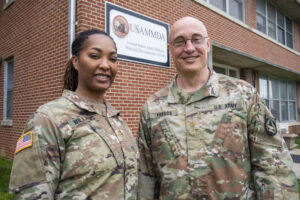
Story by T. T. Parish
U.S. Army Medical Materiel Development Activity (USAMMDA)
“I am an American Soldier…I am a warrior and a member of a team…I will always place the mission first…I will never leave a fallen comrade.”
The Soldier’s Creed spells out very clearly the values U.S. Army Soldiers live by each day, and the Army’s Sexual Harassment/Assault Response and Prevention Program (SHARP) builds on those values to reinforce a culture of respect and teamwork.
SHARP’s mission is to educate Soldiers and U.S. Army civilians about acceptable behavior, and to help those who face sexual assault and harassment find the resources available to each member of the Army team.
At the U.S. Army Medical Materiel Development Activity, Fort Detrick, Maryland, a cadre of dedicated experts, including a SHARP coordinator and leaders across the command, work on the front line to train Soldiers and civilians and to assist those affected by sexual harassment and assault.
USAMMDA’s SHARP Program coordinators, Maj. Felicia Williams and Maj. Stephen Krauss, recently spoke about the importance of SHARP, why engaged leadership is imperative to stopping inappropriate behavior in and outside the workplace, and resources available to those who are victims of sexual harassment or assault.
PAO: Why do you think SHARP is important to organizations like USAMMDA?
FW: SHARP is crucial for organizations like USAMMDA because it directly addresses the pervasive issue of sexual harassment and assault, which can undermine our mission and harm our team members. As a victim advocate, I see firsthand the devastating impact of these behaviors. The Train the Trainer events organized by the USAMMDA SHARP Program coordinators are especially valuable as they empower leaders to educate their teams, reinforcing Army values and emphasizing that sexual misconduct is incompatible with our standards of conduct. This proactive approach helps create a culture of accountability and respect, ensuring that every team member feels safe and valued.
PAO: Why is it important for USAMMDA team members to know about the SHARP Program and the resources available for people who become victims of sexual harassment and sexual assault?
FW: It is crucial for USAMMDA team members to be aware of the SHARP Program and its resources because sexual assault unfortunately remains a prevalent issue. As a victim advocate, I have seen how crucial it is for victims to have access to support and resources. By openly discussing these resources, we not only provide support to victims but also underscore the importance of respectful behavior that aligns with Army values. These conversations, while uncomfortable, are necessary to create a culture of mutual respect and safety. It also helps to dispel myths and misconceptions about sexual assault, encouraging victims to come forward and seek help without fear of judgment.
PAO: How is it a reflection of Army values to have USAMMDA leaders who reinforce the importance of respectful and appropriate behavior?
SK: All sexual harassment and sexual assaults are a violation of the dignity and respect that everyone deserves…having leaders involved really shows that they are upholding Army values, and [demonstrates] the importance of everyone upholding them at all times. The SHARP Program is really about culture change, and being very clear about what is expected behavior. And without actually having day-to-day supervisors, the leaders of those teams, involved, we can’t really get into culture change. We can’t initiate culture change only from the commander’s office. Culture change has to seep down into every nook and cranny inside an organization, and at USAMMDA, that means the directorates and the Project Management Offices.
FW: USAMMDA leaders who actively reinforce respectful and appropriate behavior are exemplifying Army values by upholding the dignity and respect that every individual deserves. As a victim advocate, I have seen how important it is for leaders to set a positive example and create a safe environment for their team members. Their leadership in promoting these values sets a clear standard for behavior, emphasizing that any form of sexual harassment or assault is not tolerated and is contrary to the principles we stand for. It also helps build trust and confidence among team members, knowing that their leaders are committed to creating a culture of respect and accountability.
PAO: Your role as SHARP coordinator must be fulfilling – how would you describe the impact on your life and career?
FW: Serving as a SHARP coordinator and victim advocate is both fulfilling and challenging. It is rewarding to provide support to individuals in crisis and help them navigate through difficult situations. As a female officer, I am proud to play a role in promoting a culture of respect and safety within USAMMDA. However, it can also be emotionally taxing, as I witness the impact of these traumatic experiences. Despite the challenges, knowing that I can make a difference in someone’s life makes it all worthwhile. My role has also helped me grow professionally, as I have gained valuable skills in advocacy, conflict resolution, and leadership that have benefitted me in my career.
SK: It is fulfilling to be able to help Soldiers and civilians in crisis. But it is also taxing…I’m seeing them because they’re being treated how no one should ever be treated. However, it is very rewarding to know that I can get hands-on and help Soldiers and civilians who need it most as they’re dealing with some of the toughest experiences of their lives.
Note to readers: If you are a victim of sexual harassment or sexual assault, there are resources available to you to find help. To find out more, please visit the SHARP home page at https://www.armyresilience.army.mil/sharp/. The Department of Defense 24/7 Helpline can be reached at 877-995-5247, and the Fort Detrick SHARP 24/7 Hotline can be reached at 240-674-2802.